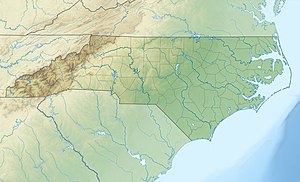Hungry River
Appearance
This article needs additional citations for verification. (September 2014) |
| Hungry River Tributary to Green River | |
|---|---|
| Location | |
| Country | United States |
| State | North Carolina |
| County | Henderson |
| Physical characteristics | |
| Source | divide between Hungry River and Broad River |
| • location | Ottanola Gap |
| • coordinates | 35°23′28″N 082°15′54″W / 35.39111°N 82.26500°W[1] |
| • elevation | 2,940 ft (900 m)[2] |
| Mouth | Green River |
• location | about 2 miles southeast of Upland, North Carolina[2] |
• coordinates | 35°16′59″N 082°21′30″W / 35.28306°N 82.35833°W[1] |
• elevation | 1,560 ft (480 m)[2] |
| Length | 12.2 mi (19.6 km)[3] |
| Basin size | 21.4 square miles (55 km2)[4] |
| Discharge | |
| • location | Green River |
| • average | 51.79 cu ft/s (1.467 m3/s) at mouth with Green River[4] |
| Basin features | |
| Progression | southwest |
| River system | Broad River |
| Tributaries | |
| • left | unnamed tributaries |
| • right | Little Hungry River Tumblebug Creek |
The Hungry River flows in western North Carolina, United States. It arises in eastern Henderson County and flows southwesterly, its entire course within Henderson County, before it empties into the Green River.[5] In 1904, the first hydroelectric plant in Henderson County was built on the river, and, in 1913, a second dam was built half a mile downstream for the same purpose.[6] Both dams stand to his day, though they are currently inoperable and slated for removal under management of the North Carolina Wildlife Resources Commission.[7]
References
[edit]- ^ a b "GNIS Detail - Hungry River". geonames.usgs.gov. US Geological Survey. Retrieved 27 July 2019.
- ^ a b c "Green River Topo Map, Rutherford County NC (Rutherfordton South Area)". TopoZone. Locality, LLC. Retrieved 27 July 2019.
- ^ "ArcGIS Web Application". epa.maps.arcgis.com. US EPA. Retrieved 27 July 2019.
- ^ a b "Hungry River Watershed Report". Waters Geoviewer. US EPA. Retrieved 27 July 2019.
- ^ "ArcGIS Web Application". epa.maps.arcgis.com. US EPA. Retrieved 27 July 2019.
- ^ FitzSimmons, Frank (1976). From the Banks of the Oklawaha (Vol. 1). Golden Glow Publishing Company. pp. 206–210.
- ^ Glancy, Gary. "Big Hungry dams to be removed; recreation opportunities expanded". Blue Ridge Now. Hendersonville Times News. Retrieved 1 January 2014.

